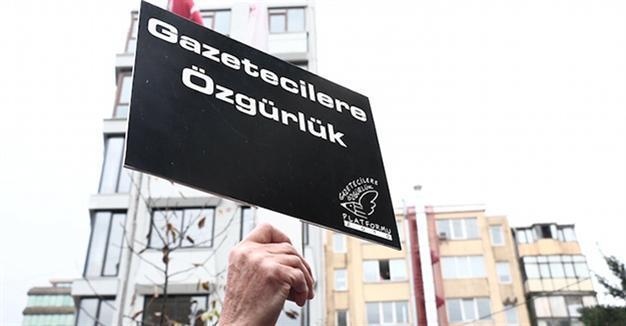894 Turkish journalists dismissed since January 2016: Report
ISTANBUL
 A total 894 journalists have been dismissed from work since the beginning of 2016, according to a fresh report by Press For Freedom, a project funded by Britain’s Bilateral Program, which produces monthly, quarterly and yearly reports on the state of media freedoms in Turkey.
A total 894 journalists have been dismissed from work since the beginning of 2016, according to a fresh report by Press For Freedom, a project funded by Britain’s Bilateral Program, which produces monthly, quarterly and yearly reports on the state of media freedoms in Turkey.The report, whose findings were announced at a press conference on May 14, displayed a gloomy picture of the deteriorating state of press freedoms in Turkey.
Two newspapers and a news agency have been “silenced” with the appointment of a trustee panel due to “strong evidence” of links to the Gülen movement, followers of U.S.-based Islamic scholar Fethullah Gülen, an ally-turned-foe of the ruling Justice and Development Party (AKP) government and President Recep Tayyip Erdoğan, the report said.
At least 160 journalists were laid off in Turkey in April, increasing the number of discharged journalists to a total 894 over the first quarter of 2016, the report said.
The research also noted some 104,904 websites were blocked while access has been denied to the website of the Dicle News Agency (DİHA) 37 times since the general elections on June 7, 2015. Thirteen of the agency’s journalists are also current under arrest.
Violence targeting members of the press also rose over the same period, as a total 200 attacks were reported against journalists, including 21 against media institutions. A fourth Syrian journalist, Zahir al-Sherqat, was killed in April by suspected militants of the Islamic State of Iraq and the Levant (ISIL), prompting the Vienna-based International Press Institute (IPI) to call on the Turkish government to take serious measures against ISIL violence on Turkish soil.
Meanwhile, a total of 33 reporters were detained between January and April 2016, 13 investigations were launched against journalists while 12 journalists were brought before court. Over the same period, 12 journalists faced charges over “insulting the president.”
In the report, Press For Freedom highlighted the situation of daily Cumhuriyet Editor-in-Chief Can Dündar and Ankara bureau chief Erdem Gül, as an Istanbul court sentenced the journalists to five years in prison for “leaking state secrets” on May 6, hours after Dündar escaped unharmed from an armed attack in front of Istanbul’s Çağlayan courthouse.
“Journalists chase news. Treating journalists and newspaper managers, who search for, write and publish news, as ‘terrorists’ or ‘spies’ displays the state of freedoms in the country in question,” the report said, also criticizing a lack of safety for reporters in Turkey’s southeastern provinces where operations against the outlawed Kurdistan Workers’ Party (PKK) have been continuing for months.
Speaking during the event, Turkish Journalists Association (TGC) chair Nazmi Bilgin stressed the importance of press freedoms to enable a modern, democratic society.
“Freedom is a must for freedom and freedom a must for the press,” he said, adding citizens’ involvement in politics and the operability of the right to information is only possible via a free media.
Meanwhile, Yusuf Kanlı, the coordinator of the project who is also a columnist for the Hürriyet Daily News, said it was not possible to speak of a democracy where opposition voices are being silenced, censorship is common and press freedoms are under pressure.
Turkey has been classified as a “not free” country by U.S.-based think tank Freedom House’s press freedom reports since 2014, when its status deteriorated from “partly free” due to the treatment of journalists during the widespread Gezi Park protests and the backlash against their coverage of corruption probes in 2013.
















